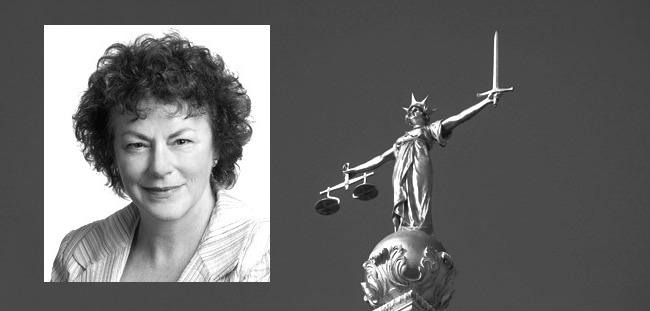
Associate Professor Donna Buckingham and a statue of the goddess of Justice, with her scales and sword.
Associate Professor Donna Buckingham wants to help more people get involved in debates about possible law changes, when she starts her new role as a Law Commissioner.
She believes whenever a law change is signalled, the Commission's subsequent recommendations can “only be as good as that high level of engagement – not only with the obvious 'stakeholders' but also with the public.”
She is looking forward to producing the type of issues papers that clearly show the public the problems the Commission is trying to tackle, so people can share their views with its members.
The Commission is New Zealand's permanent law reform body and has “a remarkably wide reach” because it can undertake the review, reform or development of any aspect of New Zealand law.
Sometimes the Commission's projects are sparked by questions. Should the legal defence of self-defence be changed so more victims of family violence can use it? Should there be a separate crime on non-fatal strangulation? How should information involving the security of New Zealand be dealt with in court so citizens are still seen to get their basic right to open justice and a fair trial?
The Commission can also examine how the legal system itself is working, for example the law governing contempt of court, which can punish people for activities that undermine the administration of justice.
Two new reviews are starting soon; one involves the Property Relationships Act which determines how the property of two partners is divided when they separate or one of them dies; the other review focuses on how enforcement authorities are using the Search and Surveillance Act 2012.
Law Commissioners are appointed by the Governor General on the recommendation of the Minister of Justice. There are currently three Commissioners; a former Court of Appeal judge, a former partner in a large law firm, and a former government Minister. Associate Professor Buckingham takes up her warrant as the fourth Commissioner on 16 May. Associate Professor Buckingham has not only been teaching law and publishing academic papers, but has also been active in the profession as part of her service to the community.
Associate Professor Donna Buckingham set up the New Zealand Legal Information Institute in 2004 to provide free online public access to legal information, including legislation, decisions made by courts and tribunals, reports and historical legal documents.
She has been involved in the New Zealand Law Society for some years as well. She chaired the Women's Consultative Group which made submissions about women in the legal profession and how the law deals with women generally. She was also on the Society's Law Reform Committee that makes formal submissions on bills at the Select Committee stage, and has been President of the Otago Branch of the New Zealand Law Society.
She is excited about her new role in law reform, which lasts for five years and means she has to give up her full-time work at the University.
“Teaching statutory interpretation and evidence has required me to become familiar with the law as it develops, sometimes radically. Now I will be approaching that process from the other end. So this is a big professional change in terms of the lens through which I start my working days.”
“There are regrets as well that come with any change. I will miss the daily engagement with students and the sense of curiosity about law and fresh sense of justice that they bring to their work.”
“I will also miss the collegiality of the Faculty of Law and the opportunities I have had to engage with other members of the University community in various committees, projects and reviews.”
“All the opportunities I have had at Otago have (I hope) given me the chance to strengthen the legal and other skills I will need for this new adventure”.
The University's mission statement asks academics to do service both inside and beyond the campus, to enhance the understanding, development and well-being of individuals, society and the environment.
Associate Professor Buckingham believes the freedom to contribute in a whole lot of different ways to that mission statement has been a rare work privilege.